[Click here to go back to Day 2.]
8:00am Faber Piano Adventures: The Power Of Technique & Artistry, by Randall Faber.
The Piano Adventures showcase session was excellent as always. Randy covered some new publications and helpful thoughts about teaching technique. Attendees received a free copy of Hanon-Faber: The New Virtuoso Pianist, the Adult Piano Adventures Popular, Book 2, and the Piano Adventures Technique & Artistry, Level 4 book. Faber’s new edition of the Hanon exercises present a selection of the Hanon exercises that have been “retooled” for the modern piano (longer strings, larger hammers, and heavier action than the piano of Hanon’s day).
9:15am What Can Musicians Learn From Sports Psychologists? by Vanessa Cornett.
Vanessa shared what she learned from her research on what musicians can learn from sports psychologists. Here some examples sports psychology practices that may parallel be useful in music performance.
- Situational Control: Thinking about what aspects of this performance experience can be controlled, and which aspects cannot be controlled.
- Detachment Training: I perform, but I am not my performance. My self-worth is not bound to the quality of my craft.
- Externalizing Thoughts and Emotions: Observing thoughts as an objective third party. Noticing without judgement before moving on. Negative thoughts usually precede negative emotions.
- Post-Performance Analysis: Objective self-assessment. Sports people video record everything and analyze their own performance, starting very young. It’s an important mental skill to develop that plays out as a behavior. It’s all feedback – it’s not necessarily about successes and failures. It’s about realigning goals.
10:30am Better Than Good: by Andrea McAlister.
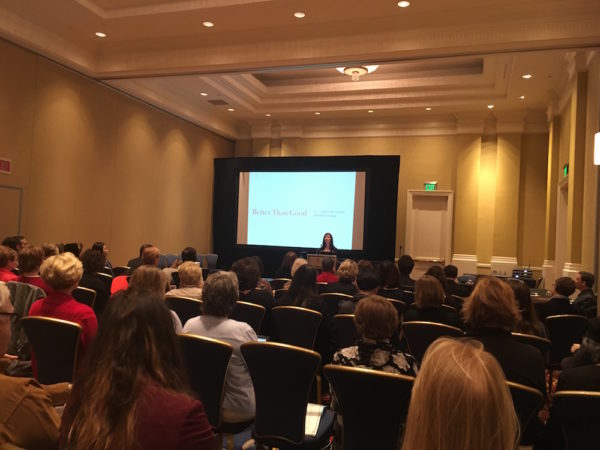
Andrea’s session was about the art of using meaningful words in our teaching, to create maximum impact and excitement in the lesson. This was probably my favorite session of the entire conference.
- As an most basic example, we tend to overuse the word “good”. It is a word that can tend to mean nothing if we don’t accompany it with specifics.
- When we praise students, instead of complimenting merely the results of the person’s intelligence (e.g., “You’re so smart.”), we could compliment and recognize the effort. And provide useful feedback on the work.
- Consider: when do our students become “musicians”? At what point do we include them into this circle? Using language of inclusion can help students take ownership, motivation, and responsibility.
- What makes a good musician is not someone who has the right answers, but someone who asks the right questions. Teachers can ask students: “What do YOU think?” “What questions do you have for me?”
- The language of humility. We need to be able to say: “I don’t know. Let’s find out.” There is an art to crafting open questions.
- Instead of “should,” try to use “could” – indicating possibility. We need to be in a place where we are always open to exploring and looking for answers, rather than feeling that we teachers always have (or should have) the answers.
- “Most people do not listen with the the intent to understand; they listen with the intent to reply.” –Stephen Covey. Let’s try truly listening to students. We can say: “That’s interesting.” “Why do you think that?” or “Tell me more.”
Here is the big question for teachers to consider about their own teaching: Who is doing the thinking during the lesson: the teacher, or the student?
Read more about Andi’s session here.
10:10am The Freakonomics of Practice, by Peter Oehrtman.
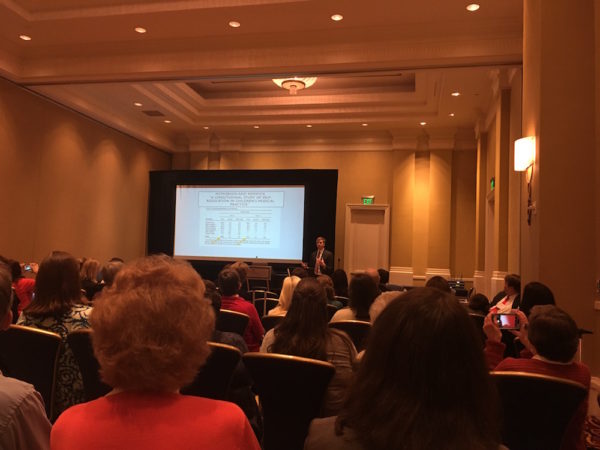
Peter presented information about how to practice more effectively. Here’s what we already know:
- Students struggle to self-regulate and mostly just run-through pieces (90 percent of the time). They seldom use deliberate practice strategies.
- Students tend to ignore errors. They tend to focus on filling up practice time requirements.
What are the solutions? Goal-oriented practice and better self-assessment leading to better error detection. It’s not how much practice, it’s how.
In a study by Robert Duke et al., the top performers used early hands-together practice, practice included inflection, hesitated (but did not stop) in order to preempt making a mistake, located and eliminated errors immediately, systematically varied the tempo, and repeated problem passages until mistakes were stabilized. What did not help: practicing longer, more repetitions, or the number of times played correctly.
Peter suggested goal-setting assignment sheet and self-assessment sheets to help students learn self-assessment. Our goal: Create independent learns who engage in deliberate practice who eventually no longer need us.
2:15pm The Art And Science of Memorizing Music, by Lois Svard.
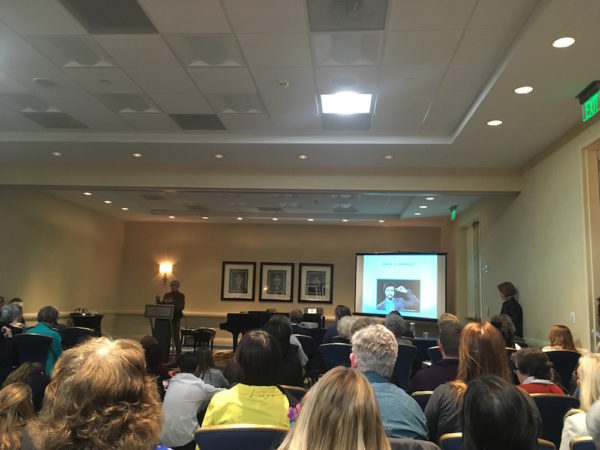
Memory is the encoding itself. How we learn music is inextricably related to memory recall. So, we must ask ourselves: what kind of learning is conducive towards recall?
Stages in learning and memory:
- Encoding. There is visual, auditory, and physical information. Music is processed everywhere in the way – it is not just a “right-brain activity”. There are 86 billion neurons in the brain, and they connect in an infinite variety of ways. When we learn to do anything, natural pathways are born in the brain.
- Consolidation. Our initial experience with a piece becomes short-term memory. When we practice, we can make it last. As we do this, the brain is adding neurons. Every time information jumps across the synapse, the connection gets stronger. This is called neuroplasticity. Practice makes permanent. The brain does not auto-correct mistakes. We cannot erase connections; we can only replace it with a new connection.
- Storage. Memory is deeper when it requires effort. Repetition that does not require much effort is not very effective.
- Retrieval. This is what we use during performance. When we learn well, the retrieval process is more likely to go smoothly.
- Reconsolidation. Every time we retrieve a memory, it changes. That is why eyewitness testimony is not reliable.
Check out Lois’ blog: TheMusiciansBrain.com.
In the rest of the afternoon, I spent some time perusing in the exhibit hall. For example, I made sure to say hello to Eik from the Sproutbeat app!

For dinner, I attended Amy Chaplin’s Piano Pantry dinner and had such a lovely time.
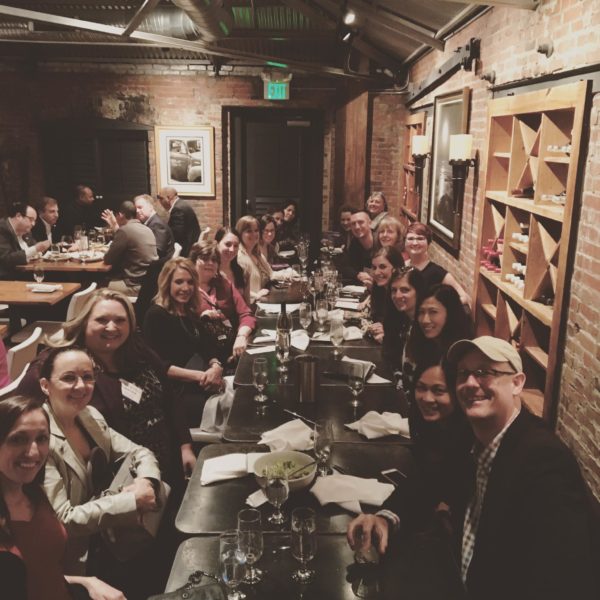
Stay tuned for Day 4.


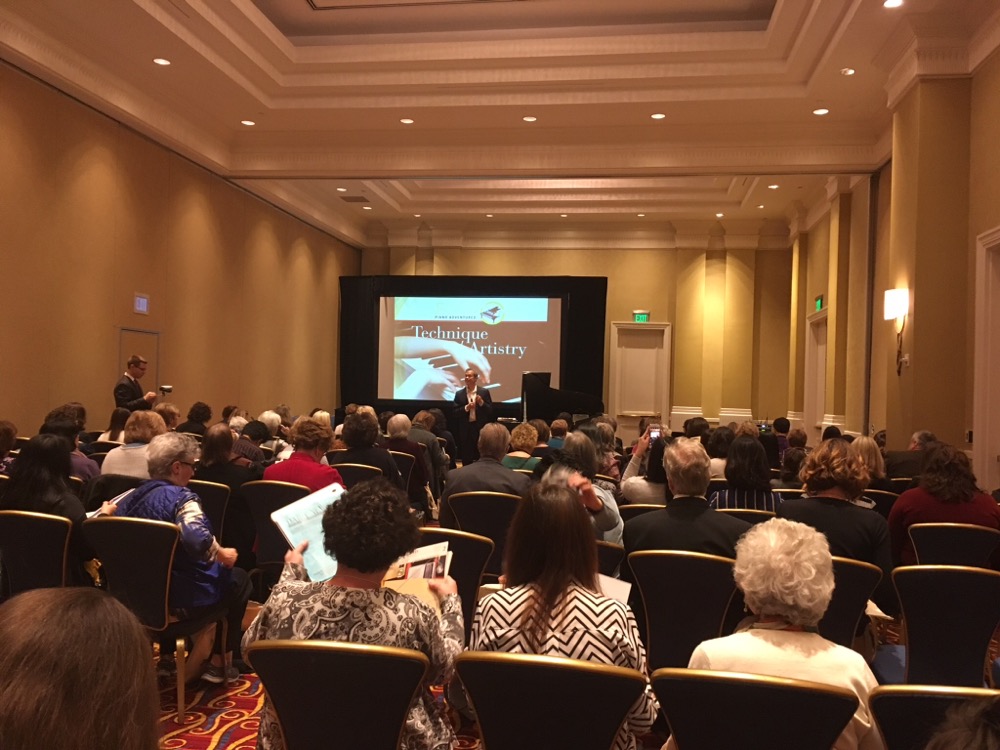

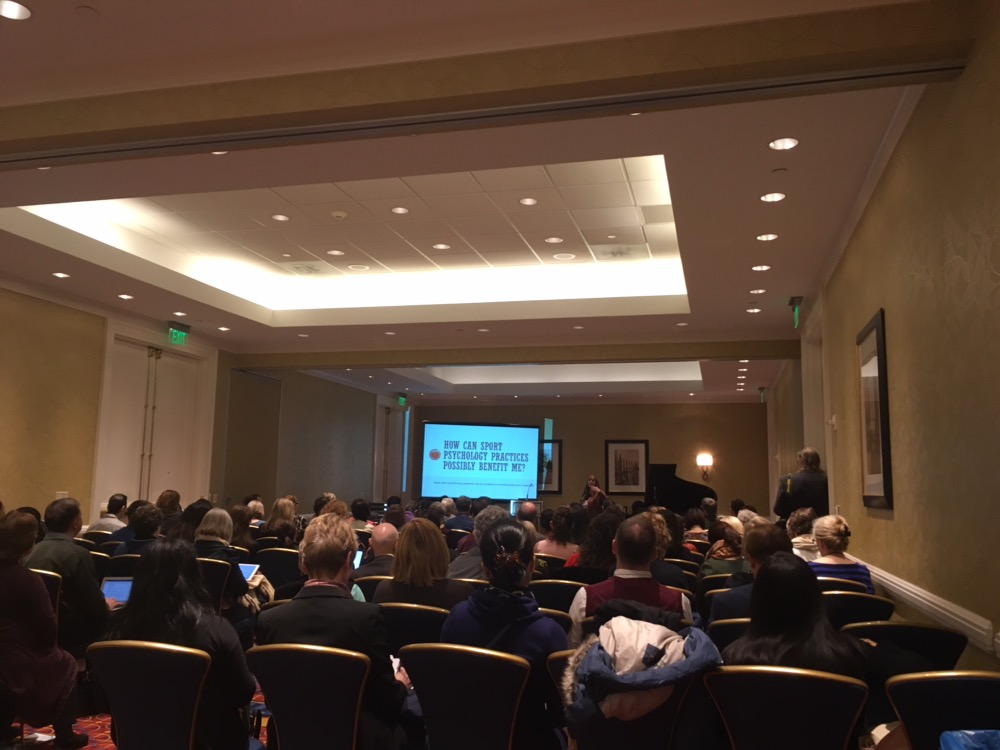
Looks like you had a blast at the conference, Joy! Wish I was there and thanks for sharing! I look forward to the Faber-hanon book.